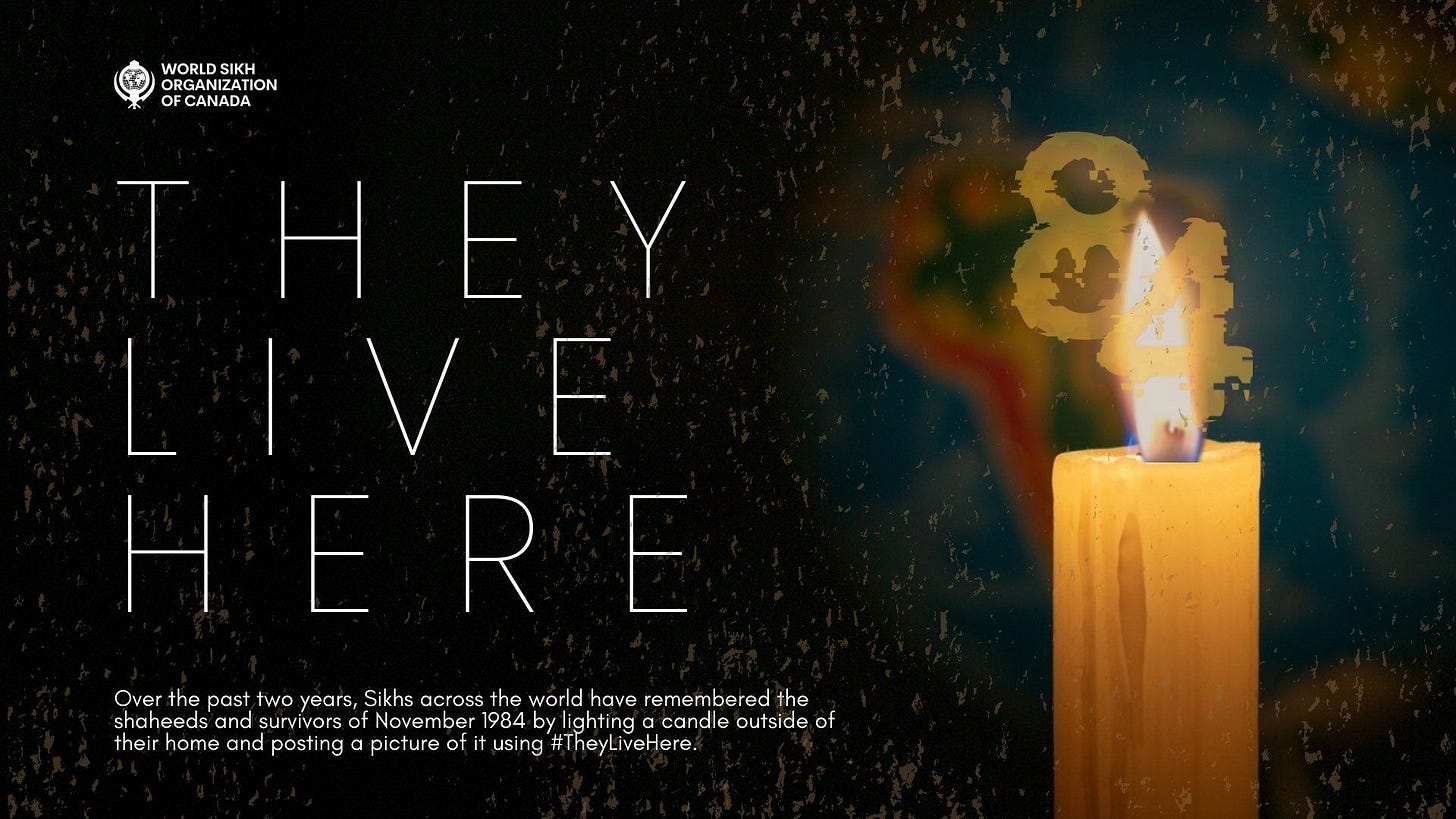Jasmeen Bassi: #TheyLiveHere & Remembering The 1984 Sikh Genocide
"Conversation keeps the memory of 1984 alive – It honours the lives of those who were killed, and it supports the plight of those who survived."
Jasmeen Bassi
November 1, 2022 | 2.5 Min. Read | Opinion
November is a time of sombre remembrance and reflection for the global Sikh community.
Each year, we honour the lives of countless Sikhs who were killed during the violences of the 1984 Sikh Genocide. In our homes, at our Gurdwaras, and within our institutions, we continue to talk about November 1984.
We talk about the trajectory of Sikh-State relations in post-colonial India and how a climate of genocide was produced by 1984. We talk about isolationism and how the events of November 1984 continue to be presented as ‘isolated riots’ orchestrated by ‘rogue individuals.’
We talk about the way Sikhs were attacked during this time. Why visible markers of difference, the dastaar and daara, were cut? Why Sikh women were raped (what is the relationship between gender, honour, and genocide)? Why Sikh gurdwaras were looted, and lit aflame?
We talk about the use of emotive governance and the production of communal violence/ chauvinism by politicians, police officers, and people of great influence to incite violences against the religious minority group.
We talk about the role of State radio and television (Doordarshan and AIR (All India Radio)) in disseminating falsified and manipulated news-information about the Sikhs, reversing the roles of victim and aggressor, in order to support communal violences perpetrated by an anxious and insecure majority, and to legitimize their pseudo-vigilante-ism.
We also talk about the absence of justice for the victims of the November 1984 violences and their families; by the several commissions of inquiry into the violences which produced vague or indeterminate reports, as well as by post-conflict justice scholarship which continues to remain remiss in “almost completely overlooking” a violence that produced innumerable victims.
We talk about the long-term challenges faced by survivors or the families of those killed in November 1984; the poverty, displacement, and homelessness. We talk about the systemic barriers faced by survivors in accessing justice. We talk about the generational traumas and overall well-being of survivors and their families. We talk about the relationship between self-determination and justice.
And the power of these conversations is immeasurable.
Conversation keeps the memory of 1984 alive – It honours the lives of those who were killed, and it supports the plight of those who survived. So let’s continue to talk – with our parents, our children, our friends, our co-workers, our teachers, our neighbours – through our oral traditions, our arts, our research, and now, digital story-telling.
As one such avenue of conversation, the WSO’s #TheyLiveHere campaign remembers the violences of November 1984 through digital photography – Sikhs around the world share pictures of their homes adorned with candles to remember a time when Sikh homes in India were marked to hunt and kill Sikhs.
Use the #TheyLiveHere tag to share your voice and let’s continue the conversation.
Jasmeen Bassi is a government partnerships analyst and holds an MA in Political Science from McMaster University. She is also a 2020 SYLI alumna. You can find her on Twitter at @___jkaur
Baaz is home to opinions, ideas, and original reporting for the Sikh and Punjabi diaspora. Support us by subscribing. Find us on Twitter, Instagram, Facebook, and TikTok at @BaazNewsOrg. If you would like to submit a written piece for consideration please email us at editor@baaznews.org.


